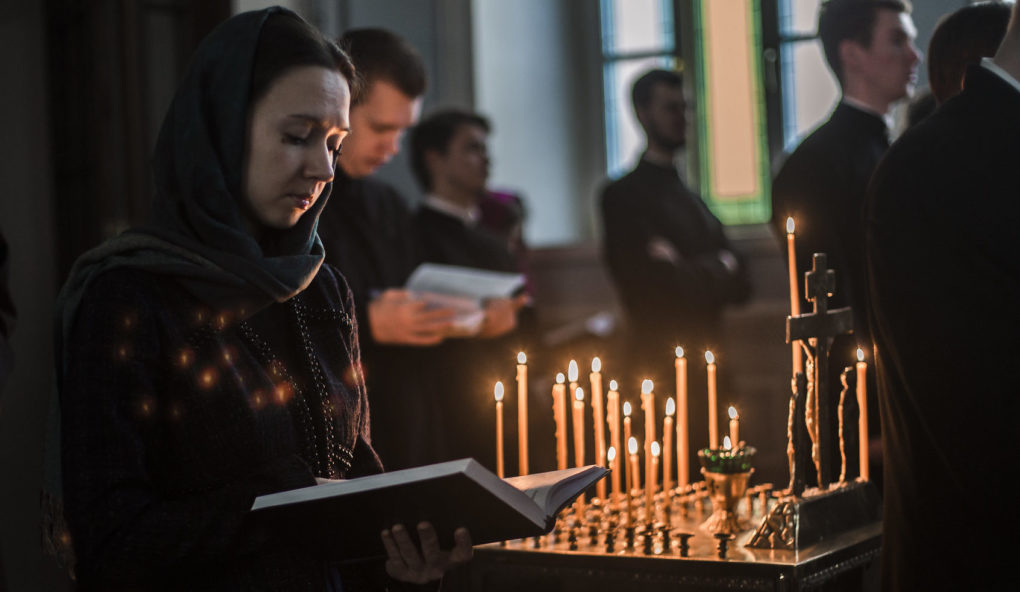Certainly, prayer is a lively, confidential and extremely frank conversation with God. A person who is praying feels that he is standing before the Lord, and perceives himself and the world around him in the light of this feeling. However, for our prayer to really become such a conversation, it is necessary to work.
We can draw an analogy with growing up. Years pass before a child is able to meaningfully communicate with other people: adequately express his thoughts and feelings, correctly build phrases, make logical conclusions, etc. All this time he is in the process of continuous learning: he listens to how adults communicate with each other , makes attempts – which are clumsy at first – to say something, pronounces separate words, which then add up to phrases and sentences. Adults read stories to him, he learns poems, and sometimes does exercises with a speech therapist. Similar things happen in every area of our activity. In order to achieve success in something, it is necessary to work, exercise, gradually master the relevant skills. And the spiritual life, an important component of which is prayer, is no exception.
It is very difficult for a person who is unfamiliar with the culture of prayer, who does not have an example before his eyes of what it means to pray, to abruptly enter into a conversation with God. This requires inner concentration, peace, a sober assessment of one’s spiritual state. One needs spiritual experience. And prayer rules – that is, prayers compiled in a certain sequence, which the Church recommends reading daily, at least in the mornings and evenings – are meant to help us acquire it.

Photo: spbpda
“A soul that begins the path of God is immersed in deep ignorance of everything Divine and spiritual, even if it is rich in the wisdom of this world,” wrote St. Ignatius (Brianchaninov) about a prayer rule. “Because of this ignorance, it does not know how and how much to pray. To help the infant soul, the Holy Church has established prayer rules. A prayer rule is a collection of several prayers composed by God-inspired holy fathers, adapted to a certain circumstance and time. The purpose of a prayer rule is to give the soul the amount of prayerful thoughts and feelings that it lacks, moreover, thoughts and feelings that are correct, holy, more precisely, that are pleasing to God. The grace-filled prayers of the Holy Fathers are filled with such thoughts and feelings” (Ignatius Brianchaninov, Ascetic Experiences).
Only by acquiring the skill of prayer and the experience of standing before God through the regular fulfillment of a prayer rule, afterwards we will be able to enter into this grace-filled state of communion with God whenever we want. And the very desire to pray will arise more often. After all, where will get the impulse to pray, if we do not have the corresponding experience?
Relying on spontaneous impulses to pray is rather naive. A modern person spends most of his life in worries and fuss. He is always preoccupied with something, is in a hurry somewhere, irritated, absent-minded or too tired. In such condition of the soul, it is very difficult to pray, if not impossible. And here a prayer rule helps us at least several times a day – in the morning, in the evening, before meals and after meals – to force ourselves to calm down, concentrate, calm and transform our thoughts and feelings, and to feel the presence of God. If, however, we simply wait for the cares of life to go away by themselves and for prayer inspiration to visit us, we can unsuccessfully wait all our lives. It just seems like praying is easy. Many saints and experienced ascetics testify that prayer, especially at first, is hard work. There is even an expression: “to pray is to shed blood.”
Another thing is that a prayer rule can be of an individual nature and can be selected taking into account the circumstances of one’s life. The morning and evening rules, which can be found in our prayer books, were compiled rather late. This means that at different times people prayed in different ways. Only one thing remained unchanged – the daily routine, the regularity of prayer. It is good if we can read the entire rule recommended by the Church, or even something else beyond that. If not, you can discuss this issue with a priest, who will help determine the size of a prayer rule. After all, it is important not only to read, but also to understand the meaning of the words spoken, to grasp the essence of prayer. Thus, step by step, daily forcing ourselves to open our prayer book, we will be able to acquire the skill of prayer and develop the ability to communicate with God. Only in this way will prayer enter our life, become its integral part, and transform from episodic into unceasing. And along with it will come quiet spiritual joy and gratitude to God for the opportunity to perceive Him and be with Him.
Translated by pravmir.com
You can follow Pravmir.com on Twitter, Facebook, Instagram, or Telegram.

















